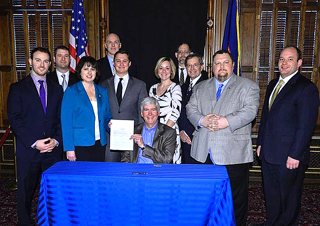This week the Senate Banking and Financial Services Committee heard testimony on Senate Bill 295, a bill that works to prohibit individuals who own blighted properties from purchasing additional properties.
The legislation would prohibit a prospective bidder from bidding on foreclosed property if the person had any unpaid fines for the violation of a local blight or nuisance ordinance. It would also require prospective bidders to register with the foreclosing governmental unit at least 14 days before a sale.
The bill would require prospective bidders to certify that they did not own property that was subject to a foreclosure judgment in the previous three tax years, or that had been included in a foreclosure petition in the tax year in which the sale was held.
In addition the bill would require the deed for transferred property to provide for the title to revert to the foreclosing governmental unit if, within five years after the sale, the property were transferred to the person who owned it when the foreclosure judgment was entered.
The League supports the concept behind the bill, and we are working with the sponsor’s office to ensure the process is workable. The committee did not vote on the legislation.


